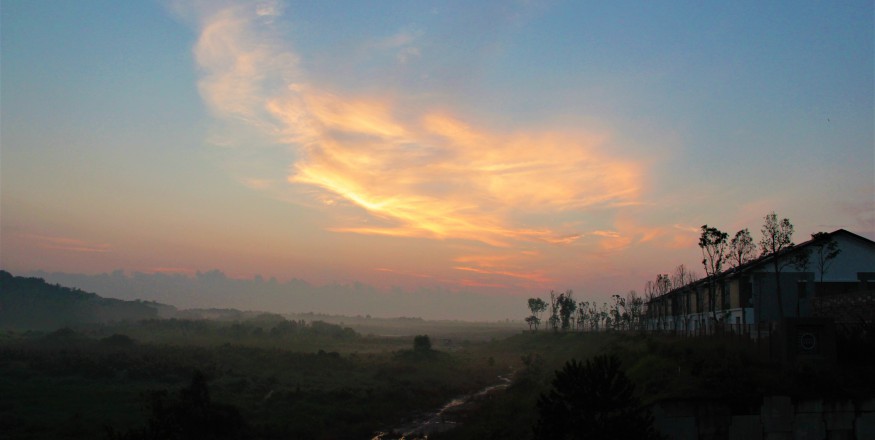They discovered Suju’s real plan as soon as he led them through one of the narrow passageways off the main street. There, under a white nylon sheet, was a small boat—revealed with a few swift movements by none other than their host himself.
Instead of walking to their accommodation as agreed, they boarded the engine-propelled boat, weaving through the intricate waterways of Venice. After a series of tight turns and careful slow-downs to avoid early gondoliers and punters, they emerged into the open sea, overlooking the northern edge of the island. From the horizon, the silhouettes of neighbouring islands could be seen—their jagged outlines sharpened by the crisp morning air. The boat sped eastward, farther than expected from their originally agreed location.
“I ran into a problem with the reservations,” Suju admitted plainly, his voice barely audible over the hum of the engine.
Both Cay and Judas turned to him.
“There were three travellers who booked after you,” he added.
“And…?” Judas asked, raising his sceptical left brow.
“…And I accidentally confirmed their booking, even though the dorm was already full. They refused the apartment I offered them instead.” Suju exhaled with a sigh. “So now it’s yours.”
Cay and Judas exchanged a glance—an entire conversation passing silently between their eyes, filled with unease and growing suspicion.
“But you will have the apartment for the same price—no extra charge,” Suju added quickly, trying to reassure them.
“It seems a lot farther from the city centre,” Cay noted, still unsure of the arrangement.
“Don’t worry. I will show you how to get there easily,” Suju replied before speeding up the boat.
They disembarked onto a narrow dry walkway and followed Suju through passageways so tight they could barely walk shoulder-to-shoulder. After several confusing turns, they reached the doorway of what was now their last-minute accommodation. This part of Venezia could easily confuse any unsuspecting visitor—its tall buildings and winding alleys forming a quiet, disorienting maze.
Suju reached above the doorframe and retrieved a key hidden there.
“Here is your key. And again, I’m really sorry about the sudden change,” he said with genuine apology.
The old wooden door, reinforced with an iron grate across the glass centre, creaked open. Inside was a dim, untidy apartment. This was far from what they expected. Suju cursed under his breath, explaining that the previous tenants had left without cleaning up. He promised a cleaner would arrive shortly to change the bed sheets and towels, and to remove whatever was left behind by the inconsiderate guests.
Before leaving, he offered one final set of directions. “Once you’re out, just turn right and head straight. Do you see the sea? Good. That’s where you’ll catch the water bus into the city centre.”
Then, he was gone.
Inside, the bathroom still had damp, used towels hanging from the shower rail. The rugs had been kicked out of place, half-revealing a dusty floor spiral long forgotten. But they were too tired to argue. They tried, instead, to settle into the chaos and make the most of what they had.
Judas had not slept well since returning from Myanmar. The image of the boy’s bashed-in skull still lingered in his mind—the gaping wound on his temple. His mother, who had met the same fate, lay five hundred metres away, lifeless.
His parents began to worry when he displayed clear signs of fatigue and disconnection. One afternoon, he nearly walked into traffic, saved only by the driver’s quick reflexes. His father, usually aloof, took notice the night Judas downed half a bottle of cognac in the kitchen—wordlessly, right in front of him.
They remained silent. No one dared ask what happened in Myanmar. They hadn’t known how to connect with him even before he left. Now, they felt even more estranged.
His mother—more fragile between the two—attempted to approach him once. Judas noticed her hesitance, her searching gaze, and slipped away into his room before she could utter a word. His father pretended not to care, though the flicker in his eyes said otherwise.
Sunday roasts continued, a hollow tradition. The warmth they hoped to recreate at the dinner table could not mask the emptiness left by their disconnected son. He sat with them, but his mind wandered elsewhere—trapped in memories he couldn’t erase. His family’s passivity only deepened his isolation. They did not know how to reach him, and he no longer wanted to be reached.
Day after day, Judas carried on: working as a waiter in a nearby restaurant, scanning job portals during lunch breaks, eating, drinking, sleeping. The repetition became his cocoon—suspending him in a limbo of neither happiness nor sorrow. It was a quiet numbness. A sovereign mundanity dulled only by time.
He had become a ghost to more than just his parents. His friends noticed too. They tried calling, messaging—he occasionally responded—but he never showed up at the pub, or for coffee, or even a walk. He avoided their concern with a subtle, deliberate distance.
This was how it had to be, Judas thought. Quiet days. Quiet endings. He hated the world for what it had shown him—for that boy, that mother, and the countless others erased without justice. His silence was his rebellion. His solitude, a shrine to the memory of those who had been slaughtered and forgotten.
He rose from bed one morning, deciding against speaking to his mother. Instead, he moved toward the window overlooking the street.
The view hadn’t changed. Pedestrians strolled by with their dogs. Couples laughed. Someone chatted about job interviews and groceries. The normalcy mocked him.
He longed to forget the bloodshed—the echoes of gunfire, the mutilated bodies, the unbearable powerlessness. But the tears that welled in his eyes had nothing to do with emotion. His conscience was leaking. And even blinking would not rid him of that haunting sting.
The illusion of normal life had shattered. What remained was the truth—ugly and irreversible.
ns216.73.216.143da2





















